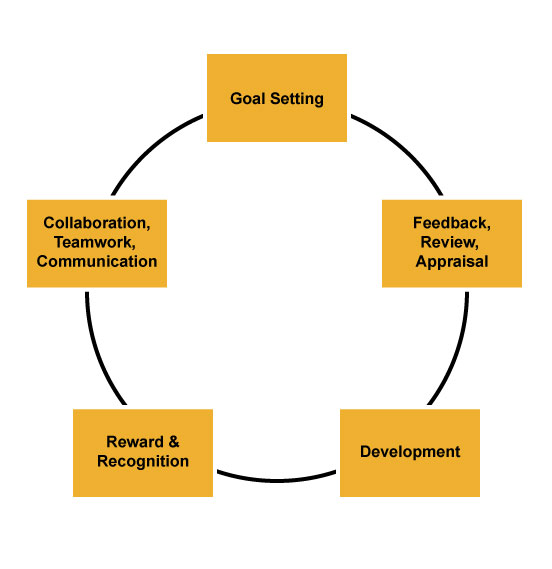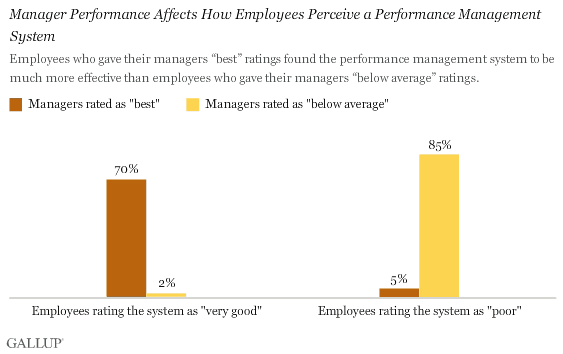Performance is the true litmus test for survival in the marketplace. High-performing employees contribute superior performance, giving the companies they work for a competitive advantage -- and their extra effort differentiates great organizations from merely good ones.
An effective system should encourage collaboration, teamwork, and communication.
It's crucial for businesses to have systems in place to identify, recognize, reward, and retain their top performers to achieve sustainable growth. Most companies understand this and spend enormous sums acquiring a performance management system to help ensure their success. Yet wide variation in employee performance persists despite this investment.
To investigate why this variance occurs, we reviewed employee engagement data from one of the most significant emerging economies -- India. Our analysis included data from more than 50,000 employees working in 10 major industry sectors in 22 global companies.
We learned that more than half of the employees (54%) felt that their company's performance management system was not effective. This perception is likely to demotivate employees, creating feelings of anguish or frustration that negatively affect their performance, which ultimately defeats the whole purpose of designing and setting up an effective system in the first place.
We also wanted to discover why the same system was viewed differently by different employees -- and why some found the system to be effective while others didn't. To determine the elements of an effective performance management system, we asked members of the human resources function in the 22 companies: "What makes an effective performance management system?" From their responses, five common themes emerged, as shown in the graphic below.
 An effective performance management system starts with a thorough goal-setting process, followed by regular feedback and reviews/appraisals. It also identifies employees' developmental needs and includes robust reward and recognition practices. The system also should encourage collaboration, teamwork, and communication.
An effective performance management system starts with a thorough goal-setting process, followed by regular feedback and reviews/appraisals. It also identifies employees' developmental needs and includes robust reward and recognition practices. The system also should encourage collaboration, teamwork, and communication.
The manager's effect on a performance management system
Fundamentally, a performance management system is composed of process and people elements. The process element includes items such as job descriptions, rating criteria, the time period of performance appraisal discussions, and reward and recognition systems. The key component of the people element is the manager, who drives the system by setting expectations, communicating plans, encouraging development, and giving and receiving feedback.
Our analysis revealed that most companies invest in world-class processes for their performance management system, but they overlook the importance of the people element. And because managers have the greatest impact on that element, we decided to investigate whether managerial ability was responsible for the variance in employee experience with the system.
To determine the manager's effect on the performance management system, we conducted research with the same participants from our initial study. To gain a sense of managerial ability, we asked each employee to rate his or her manager to determine how much managers:
-
helped employees feel empowered
-
recognized or praised employees' achievements
-
cared about their employees
-
had regular discussions with employees
Those who received top scores were considered "best" managers, while those who received the lowest rating were considered "below average."
Next, we looked at how satisfied these same employees were with their company's performance management system. Employees were asked to rate the system by indicating their agreement with the statement "My company's performance management system clearly differentiates the good performers from the poor performers in my company." A high score earned the system a rating of "very good," while the lowest ratings earned the system a score of "poor."
Our analysis revealed that employees who gave their managers "best" ratings found the performance management system to be much more effective than did employees who gave their managers "below average" ratings.
-
Seventy percent of employees who gave their managers "best" ratings rated their performance management system as "very good."
-
In contrast, only 2% of employees who rated their managers as "below average" gave their system a "very good" rating.

The relationship between employees and their manager is key
Though good processes are important in any performance management system, the human element is the most important component in whether employees perceive the system as effective. The relationship between an employee and his or her manager is the key factor in driving those perceptions, and it accounts for the great variance in those perceptions among the employees we studied. Our research with these 22 companies revealed that great managers:
-
clearly communicated performance standards and what good performance in a role looks like
-
focused on employee strengths rather than weaknesses
-
helped employees understand that the purpose of the performance management system was to aid in their development; it was not just an activity required for pay or promotions
-
communicated regularly with their team members on performance expectations, rather than once a year
A company might have a world-class performance management system in place, but the system is only as effective as the managers who implement it. Companies that want to increase organizational and employee performance and productivity should invest in getting the right managers in place and support them in engaging their employees.
This article is adapted from one originally published in People Matters by SHRM India. Reprinted with permission.
